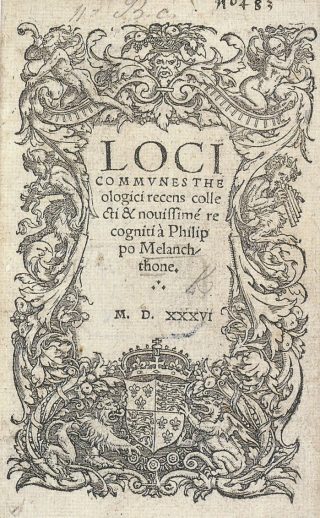Philip Melanchthon published his first major theological work, Loci Communes (Theological Commonplaces) in 1521. At the age of 21, in 1518 Melanchthon had come to Wittenberg to teach Greek, but soon took on other teaching responsibilities.  He began to lecture on Romans and embraced Luther’s teaching on justification. In this new work, he attacked the scholastic understanding of grace and salvation. In so doing, he also affirmed the biblical teaching on justification by faith alone.
He began to lecture on Romans and embraced Luther’s teaching on justification. In this new work, he attacked the scholastic understanding of grace and salvation. In so doing, he also affirmed the biblical teaching on justification by faith alone.
Melanchthon stated that the scholastics had distorted the meaning of grace, especially the Thomists who understood grace to be a quality of the soul. Rather, he defined grace as God’s kindness or merciful will toward sinners. Based on Romans 5, Melanchthon identified the Holy Spirit as the gift who produces fruit in the believer. He also commended Peter Lombard in this case for understanding grace better than latter scholastics.[1]
In his examination of faith and justification, Melanchthon also specifically refuted the scholastic understanding of these topics. First, he clearly confessed the same teaching that Luther had asserted regarding justification. The Gospel is the free forgiveness of sins for Christ’s sake to which the believer clings by faith alone. (Romans 4:5) Melanchthon also rejected the scholastics’ false distinction between and unformed faith without love and a saving faith formed by love. True faith that saves is a gift of God because the flesh cannot believe without God’s grace. What scholastics call the “unformed faith” equates to a mere opinion about historical events. True faith, on the other hand, constantly hangs on God’s word by which the Spirit illuminates and renews the soul. Ultimately, it is a “trust in God’s mercy promised in Christ.”[2]
[1] Philip Melanchthon, Commonplaces: Loci Communes 1521, trans. Christian Preus (St Louis 2014), 111-12.
[2] Ibid. 115-19.